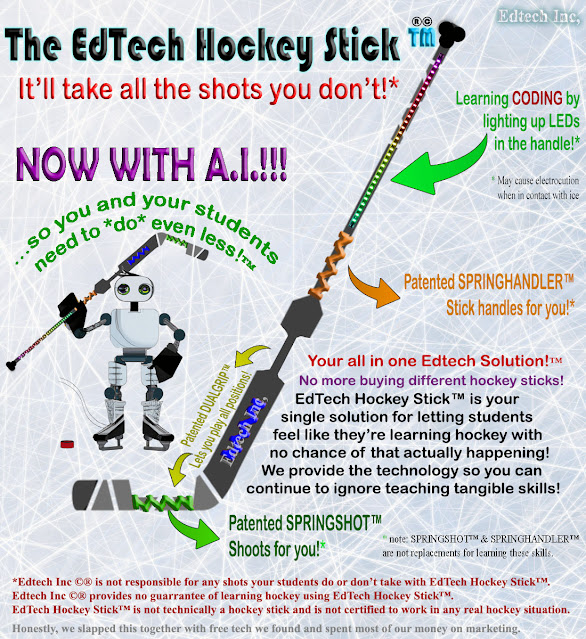At its heart the widening digital divide is a inclusion and equity problem. Students who can't afford tech at home lack familiarity and fall behind when schools bring it in with no training for staff or students. It would be more productive if education in Canada did more than talk about DEI, but that would require strategic vision which we lack.
In my travels I've come across many edtech 'solutions'. These often involve off-the-shelf technology that has has been branded to meet a specific need in a 'turn-key' way so learning essential digital skills doesn't actually require any on the part of the instructor or students. The appearance of technology in a classroom is usually the goal, rather than the learning of fundamental digital skills. Of course, this bespoke marketing comes with a huge bump in price. I love seeing $15 open source Arduino microcontrollers paired with $10 in sensors and called a 'climate change' edtech kit, yours for $80! In many cases a hard sell accompanies these kits that are guaranteed to teach the STEM skills you don't have. UNESCO has something to say about this global phenomenon:
 |
| UNESCO's 2023 Technology in Education, a tool on who's terms? is well worth a read. With Canada's lack of a national education strategy, we have to find vision elsewhere. Someone asked me if I might do my Masters in Educational Technology and without hesitation I said, "educational technology is the worst kind of technology, why would I want a masters in that?" |
The frustration around this has been gnawing at me and when I woke up this morning I had the edtech hockey stick floating in my head, so I made some marketing for it:
 |
| It's satire, it's supposed to be over the top or it wouldn't be satire. |
The hockey metaphor brings home the absurd nature of the edtech dance we're in. Anyone who actually plays hockey will take one look at this thing and laugh. To someone who knows nothing about hockey it looks like it might work as both a player and goalie stick, but it will actually do neither thing. Edtech works the same way; it's selected and used by people who aren't skilled in technology, so this edtech hockey stick, like so many edtech solutions, is a marketing exercise bereft of pedagogical value that thrives on a lack of technical fluency. There isn't much incentive for edtech companies to address this ignorance, though branded educator 'qualifications' in edtech sure are popular.
The pedagogical solution is to learn digital technologies and media from the ground up instead of implementing simplified solutions like Chromebooks, the edtech hockey 'stickest' of them all. This is a one trick pony that ties learning to a single multi-national's browser and cannot provide any locally processed content. The cloud is where edtech solutions thrive because you can easily monetize access. The hard sell for strapped educational IT departments is that Chromebooks don't give you administration headaches because they can barely do anything, but like the edtech hockey stick they look like they can do just enough to make it look like you're doing something about the digital skills gap.
I am a relentless advocate for bringing real world technologies into our classrooms and showing students how to master them. The results speak for themselves. Whenever I bring the digital skills crisis up in Canadian education someone pipes up with "education is not just about job skills!". Indeed it isn't, but as a poor immigrant kid I can't help but see the privilege that opinion is couched in. Whenever someone suggests that it's their professional obligation to do less, I'm left wondering what they think professionalism is. I'd love to see educational professionals tackle the hard work of digital divide DEI and digital skilling like it matters instead of finding reasons to continue ignoring it while the edtech piranhas profit.
NOTES
There is no such thing as "Canadian Education". The PISA results everyone waves the flag about happen on the back of the four largest provinces. If you're elsewhere in the country you may be below the world average.
https://www.fraserinstitute.org/blogs/pisa-results-a-breakdown-by-province
"PISA results show each of the Big Four provinces of Ontario, Quebec, Alberta and British Columbia achieving significantly higher average reading scores than all G7 member countries except, of course, Canada. The Big Four also outperformed five of these six G7 countries in math and science (the exception being Japan, which scores below Quebec in math and below Alberta in science)."
"... if we only consider PISA results for the remaining smaller six provinces, Canada fares much worse, placing 17th in reading (below the United States, the United Kingdom and Japan), 18th in science (again, below Japan, the U.K. and U.S.) and 30th in math, just below the OECD average."
That edtech companies are feeding off this siloed inequity is part of a larger problem. Next round of PISA is looking at digital skills (because we're in a global shortage). I'm curious to see how that gets politicised. Wouldn't it be something if we actually did something about our astoundingly poor digital fluency instead of buying for-profit solutions with little educational value?


